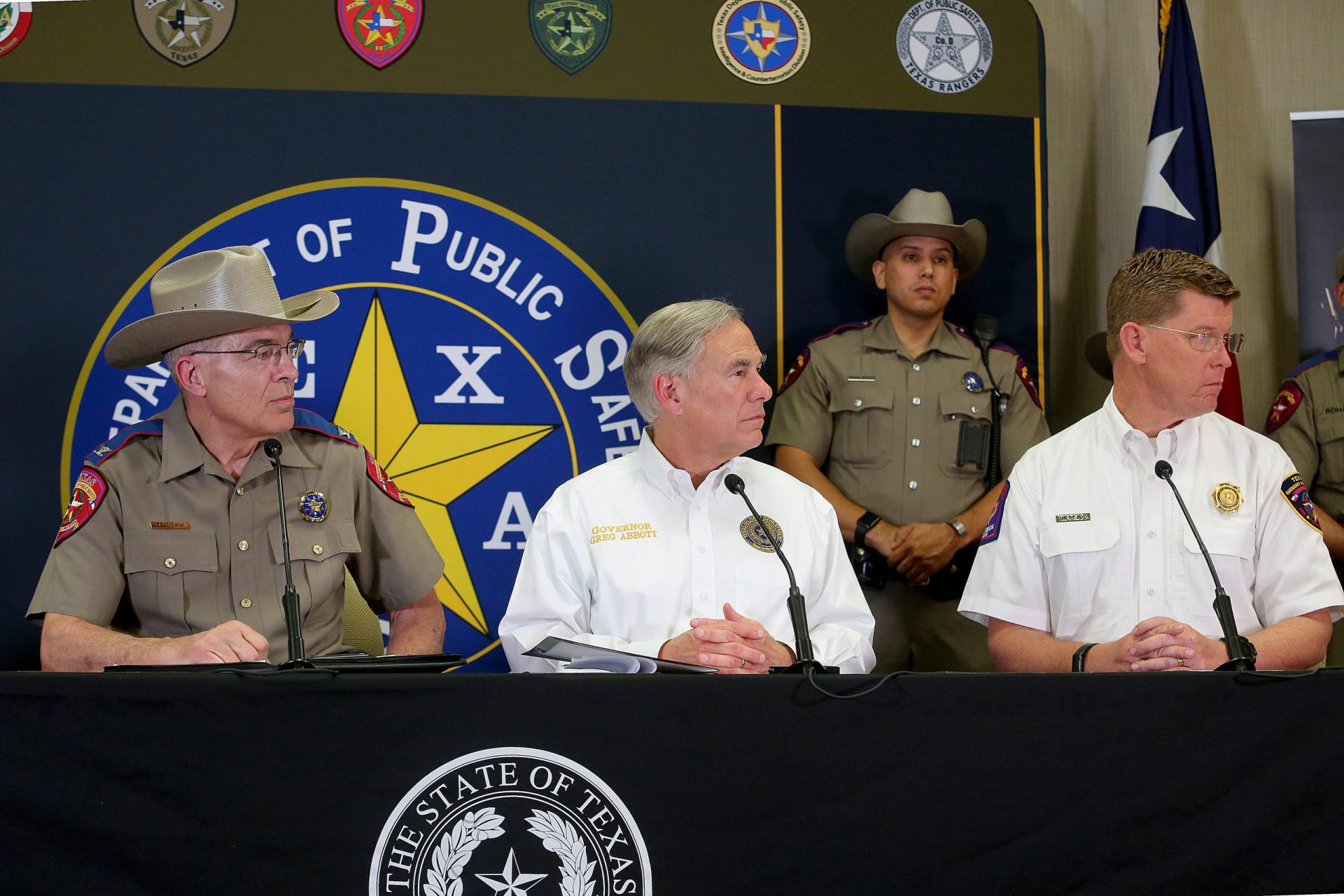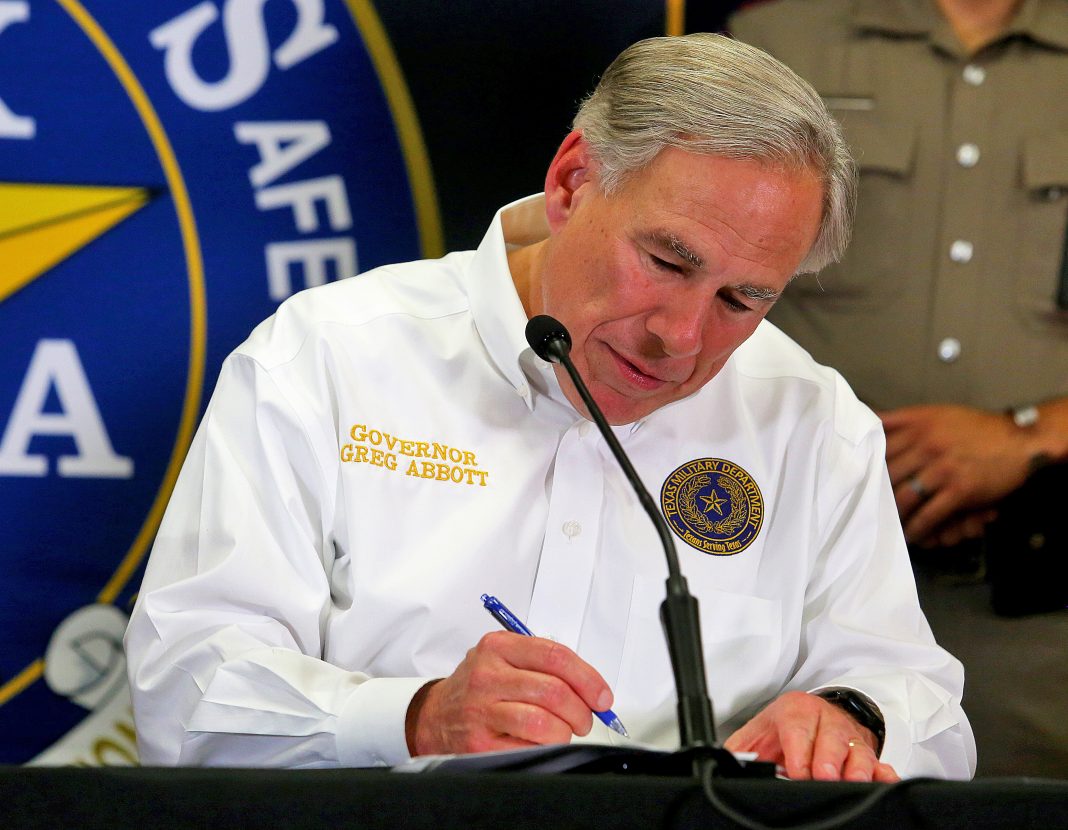WESLACO — As part of Gov. Greg Abbott’s continuing border security campaign, he signed two letters Wednesday afternoon in Weslaco directing state employees to conduct safety inspections on inbound Mexican traffic and to use state funding for bussing migrants from border cities to D.C., though local leaders and advocates question the benefit to the Rio Grande Valley.
“It is unprecedented and it is dangerous,” Abbott said during a news conference at the Texas Department of Public Safety headquarters in Weslaco.
He referred to the number of migrants expected to cross into the U.S. after the Centers for Disease Control and Prevention announced last week the upcoming suspension of a public health policy, known as Title 42, leveraged during the pandemic to keep immigrants from seeking asylum over 1.5 million times.
The policy will no longer be in use by May 23. The U.S. government projects many will attempt to seek asylum.
“Based on these projections the SBCC is currently planning for 6,000, 12,000 (high) and 18,000 (very high) encounters per day,” according to the Southwest Border Strategic Concept of Operations plan.
“Texas will be taking its own unprecedented actions this month to do what no state in America has ever done in the history of this country to better secure our state, as well as our nation,” Abbott said.
The two-phase plan was revealed, only in part on Wednesday; the second will be disclosed next week.
TWO LETTERS
The governor signed a letter charging DPS with conducting enhanced safety inspection of incoming Mexican traffic at ports of entry to deter smuggling of persons and illicit substances.
“We already do this at these bridges, anyways. We conduct safety checks. We’re only expanding it,” DPS Director Steve McCraw said. “We’re going to do a small percentage right now.”
The Texas Division of Emergency Management Chief Nim Kidd, sitting to the governor’s left, then took the second signed letter tasking his department with bussing migrants released from federal custody into border cities, like McAllen and Brownsville, to Washington, D.C.
“Our team has already begun communication with local officials to identify pickup location points, resources have been ordered and we’ll be ready to implement our part of this plan tomorrow [Thursday] morning,” Kidd said.
The deterrence strategies will also include the Texas Military which will use a maritime strategy creating boat blockades using resources from DPS and Texas Parks and Wildlife; an engineering approach will rely on concertina wire hastily deployed in low water crossings, high-traffic areas and will be used to create holding areas, Maj. Gen. Thomas Suelzer said.
Container blockades will also be deployed to drive people away from low-water crossings, the governor added.
As of Thursday, the National Guard will begin the first phase of mass migration rehearsals to begin preparation for a “potential mass influx of people coming across the border,” Abbott said.
Riot gear will be provided for troopers and specially trained National Guard.
Residents living on the border, already accustomed to a higher presence of law enforcement than those living further into the state, were advised to brace for a greater saturation.
“If you live along the southern border of Texas you can anticipate to see increased military activity in the RGV along the Anzalduas bridge area, Eagle Pass, Del Rio, Laredo and Zapata,” Maj. Gen. Thomas Suelzer said.

LOCAL REACTION
McAllen’s mayor, Javier Villalobos, asked residents in a video last week to reach out to lawmakers demanding immigration reform. He was skeptical about the logistics involved in the governor’s directives.
“If the governor in any way can assist in transporting people out, we would welcome it. How he’s going to do it, we don’t know the logistics,” Villalobos said. “Some immigrants may want to go there. Some might not. And that’s where I think you’re going to have the issues. I don’t think anybody can forcibly take somebody to a place where they don’t want to be.”
Migrants released from federal custody have permission to move through the country until an immigration court judge determines whether they will be sent back to their home country.
Sister Norma Pimentel, executive director of the Catholic Charities of the Rio Grande Valley, helps migrants through the nonprofit organization with food and temporary shelter. Pimentel had similar concerns upon hearing of the governor’s plans to move migrants released from federal custody to D.C.
On Wednesday afternoon, the executive director wondered whether the state would work with Border Patrol to coordinate transportation.
“It’s hard to understand or say anything with something that is not very clear as to how it’s going to happen,” Pimentel said. Abbott, nor those in his company at the news conference, did not share details.
Currently, migrants released from federal custody must pay for their own bus or plane tickets taking them to their final destination in the U.S.
“I think that would be good if they ask the migrants, ‘are you going to the East Coast? So, yes? Great!’” Pimentel said, though she stressed the importance of protecting the migrant’s rights.
Kate Huddleston, staff attorney at ACLU of Texas, echoed that sentiment.
“Gov. Abbott is once again using migrants as scapegoats for political gain while attempting to interfere with a fair and humane immigration process. Any forcible busing of migrants across the country would be outrageous and blatantly unconstitutional. Given that Abbott cannot dictate where people are sent, he has already backpedaled on this heinous plan, announcing that it will be only voluntary,” Huddleston clarified in a statement shared with The Monitor.
ECONOMIC IMPACT
Abbott said state residents will feel an impact.
“Because Joe Biden is not securing the border, the state of Texas is having to step up and spend Texas taxpayer money doing the federal government’s job,” the governor said, though he did not go into the specific funding or amount set aside to cover the expense.
Villalobos also grew concerned with the impact Abbott’s decision will have on the economy, specifically after the governor acknowledged his instruction to enhance vehicle inspection outside bridges will lead to longer wait times.
“Because of the type of commerce we have, the maquilas, the warehousing, we send a lot of money to the United States, to the federal government,” Villalobos said. “And that is definitely something that concerns me. Anything that slows down our commerce, slows down our economy, slows down the profits of our business owners.”
McCraw said he expects legal challenges.
“We wouldn’t be surprised by a lawsuit,” he said during the news conference. Yet, he said he felt the state would eventually prevail.
McAllen’s mayor is still hoping for a long-term, bipartisan solution.
“I hope we don’t start mixing up safety and politics for the purpose of politics. I hope, if we’re talking about public safety, let’s do public safety,” Villalobos said. “But we cannot and we should not interfere with our commerce.”
Pimentel also said that what’s expected in terms of a migrant surge is nothing she hasn’t seen before, and doesn’t share the governor’s concerns.
“We will find a way to manage the numbers, even when the numbers are high, because we’ve done it in the past,” Pimentel reassured. “I think at this point, because we’ve been doing this for a while, we’re better prepared to know what to do.”




